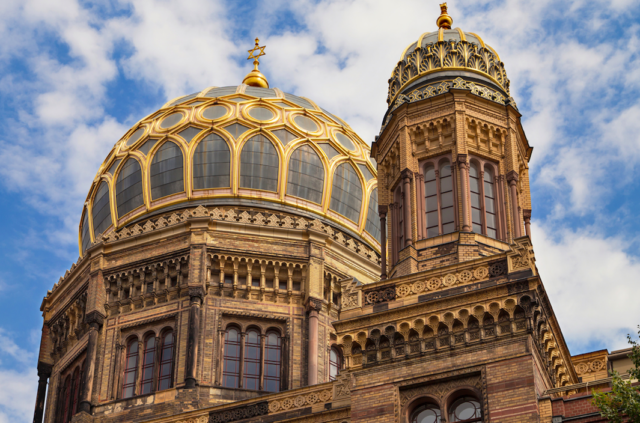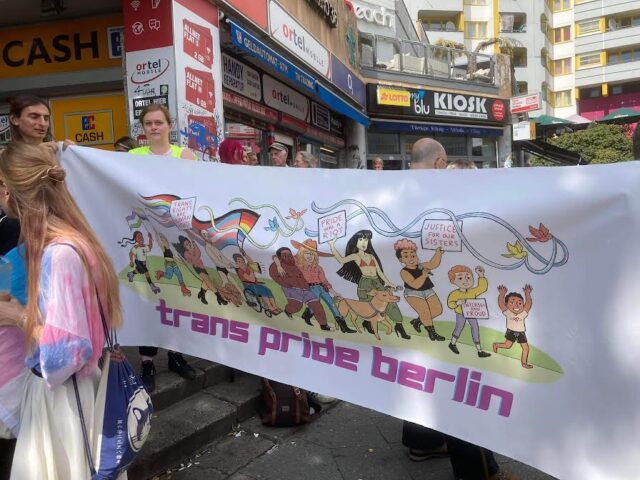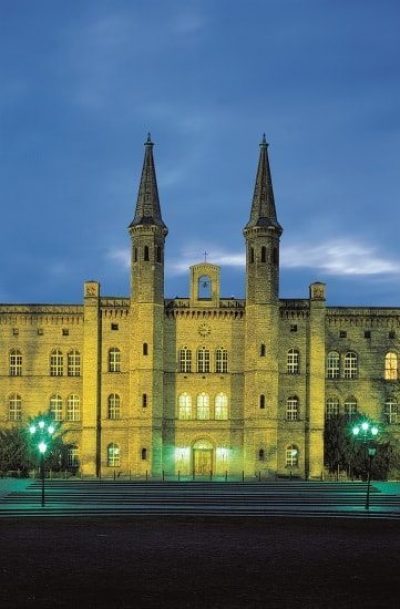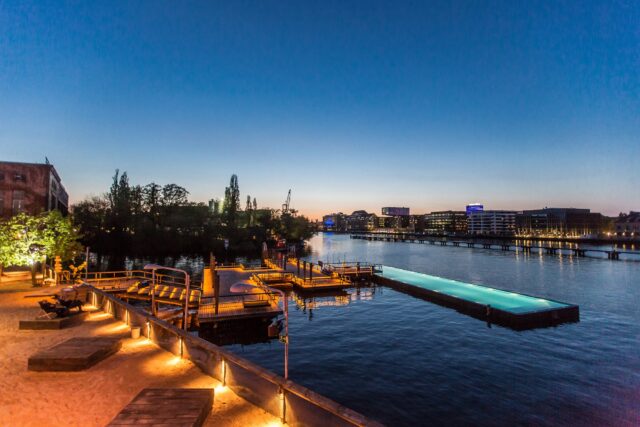It’s Tuesday in Berlin, and leather pants are an anytime affair. People have just come from a punk show, or a sex club, or the U-bahn station (and don’t you fucking stare!). Berlin is different from the rest of Europe, but it’s still Europe’s best fantasy. I learned that this past summer when I visited to present at an international conference on weight stigma at Humboldt University, Unter den Linden.
On this particular Tuesday, I was coddled by Berlin’s cozy kneipes and thrilled by her subtle subversions, standing on the balcony between the 12 meter high doors trying to get cool in the air-conditioning-free conference room. Sculptures of men in robes loomed eye level on building tops in the square across the street. Everything is casual or historically formal in Berlin and sometimes, weirdly, both.
Later in the week, at the conference, I ran into a South American suitor who had wooed me briefly before the pandemic. We’d broken up after three weeks of dating and one fine romp just weeks before the 2020 lockdown. Somehow, the pandemic isolation softened me to her advances. I thought about how fun it would be to attend Pride events together in Berlin. We carried on planning the week-long date like we had good sense. Then bam, there we were in a hotel room, nose to nose in bed after not having laid eyes on each other in the intervening three years. It might have been a bad idea, but at least we were in Berlin.
We went sight-seeing, specifically interested in the way Berlin has addressed the holocaust. They’re handling things. Using art. And compassion. They are actively considering their past and offering monuments and creative outlets. (Unless you’re a Nazi in the woods. Yeah, they’re still there too, on Berlin’s outskirts.)
In the U.S we’ve not handled historical genocide or eugenics-driven governance or current inequalities well or adequately. Many of our politicians are actively trying to bar truthful history about slavery, theft of indigenous land and more from ever being taught in public schools. Handle the past with care and repair? We don’t even want children to learn about it. Berlin is not perfect, but I’m convinced that part of the urge to digest and discuss the past comes from the mix of experiences and perspectives in Berlin.
It turned out that my date liked the idea of me far better than she liked actually being with me, which was irritating but not maddening. She had some issues. She thought I had issues too, but no, I’m sure the issues were all hers. Sure of it.
Though my date was growing terse, we traversed the Jewish sights with temerity. The idea that tours of tragedies can be taken in on vacation with no personal repercussions is odd, but Berlin is an odd place. Both tragedies and fantastic cocktails collide, enhancing one another. And the panoply of cuisine! We both enjoyed the New Synagogue exhibits and then got in a spat in an outdoor café at the height of one of summer’s many heat waves. I still remember that perfectly melted goat cheese and fruit confiture on toasted baguette with salty skinned almonds on the side. (No idea why we quarreled.)

We did get to attend Pride together, though. The largest, best attended Pride festival in Europe, to be specific.

My date and I held hands in the crowd and ate Peruvian food, but no vulva-shaped waffles which were offered in sweet and savory ubiquity. Oh, and the leather pants! I’m 55 and a lot of those hot pants (literally!) were on people my age and older. You just don’t see that in North America. At one point, a tall leather-wearing masc – she looked about 65 – got up from her table, facing me, seated, with my date’s back to her. She raised her eyebrows and gave me a slow, thirsty once over, never smiling, for which I held appropriately still, meeting her gaze when it returned to my face. From me, she received a delighted smirk, which she took in, finally glancing down at my date and deciding (correctly) that this all looked like a hassle.
Every time Berlin seems difficult or opaque, it chuckles and lets you in on the joke just before you anger. At the end of the week-long date, my companion’s flight was canceled due to a strike at Lufthansa. I was moving on to teach a Contemporary Art course and needed respite from her shenanigans. She looked at me like I was the biggest bitch walking when I told her she would have to find new lodgings for the night.
“She’s an adult with a credit card; she’ll be fine!” I defended myself to my colleague when he gaped agog at the notion that I’d dumped my date in the lobby. She was still sitting there when he and I met for cocktails later that evening.
“I didn’t dump her. Lufthansa dumped her!” I had moved on.
Thus began my three-week course in which students were to view exhibits and create in response to Berlin’s contemporary art scene. Some of my students also had flight delays from North America, and I genuinely wept when they all arrived. We’d been planning and postponing this course for three years after all. As with any group of U.S. college students, some of them had never left their homeland. They fell in love with Berlin immediately.
While we visited museums like the Hamburger Bahnhof, Bau, the Julia Schostek Collection, students also went to dance clubs, kink clubs, karaoke and bowling. (Yes, the Germans love American bowling at places like Berolina Bowl.) I mostly rested while students saw the city because our pace was formidable. (Okay, I drank a few swimming pools as well.)
My friend Robin Burke, whom I met in his hometown of Galway nearly two decades before, took pleasure in attending my students’ exhibitions and even joined us for bowling. He moved to Berlin 15 years ago and has a family there now. He’s a musician who also does optical DJ work.
I asked him about his first trip to Berlin – why it made such an impression. “As soon as I arrived, […] I went to [a] gig, loved it, met a couple of people, Germans, Swedes, others. […] That first trip, I ended up being called a vampire by the other hostel folks because they’d be up at 8 to go out sightseeing. I’d be coming back from whatever party nights and concerts I’d been to.”
Unlike Robin, I didn’t seek out any concerts in Berlin. My pace of human contact sometimes overwhelmed me during that three week course I was teaching, but this is another way Berlin woos: the less-than-perfect open spaces, beautiful buildings with graffiti and overgrown parks mirror my broken and reclaimed internal landscape. A lot of us have been damaged by life and circumstances and Berlin invites us to normalize reinvention. I am still beautiful in turmoil too, my inner tendrils reaching for sunlight past broken bricks and crumbling facades.
I met a delightful Bulgarian trans man, an artist, during my stay, and he suggested I see the Werbung show at Kunstraum Kreuzberg, which I enjoyed greatly. I walked alone toward the Kunstquartier Bethanien. Kunstraum was just one of the arts spaces there. Built in 1847, it’s a former hospital and continued to serve as one until 1970. I felt soothed by the gentle decay of grafitti’d buildings adjacent to which people had made a small take-one-leave-one book kiosk and some hives for bees. I recalled the anarchist picnics of my 1980s youth in Southern California as I passed the clusters of summer-clad loungers playing music and making group art projects in the park in front of the Bethanien building. Inside, one small art space after another beckoned, around a courtyard housing Drei Schwestern, a swank eatery which had no impromptu dinner availability for one. I walked back out into the neighborhood to eat amazing Swiss food at Schwarze Heidi a few blocks from Mariannenplatz.

So many foreigners become smitten with Berlin because of what it offers for their particular interests. It’s astonishing that so many interests can be served by one city, but that’s the power of art. I asked my new Bulgarian friend, Vijay, what prompted his desire to move to Berlin.
“Berlin is the queer capitol of Europe […] It’s impossible to go outside, to ride the bus, to go to a restaurant…without it seeming like 50 percent of the people are queer. It’s something I’ve never seen anywhere else, not even in Barcelona, not even New York…”
Vijay also expressed anguish at being transgender in his home country. “Being trans in Bulgaria is hell on earth. You can’t change your documents; there is no legal hormone therapy. Everyone who is on hormones buys them illegally from Greece and then they inject themselves, or friends do it. The whole thing is somewhat dangerous. I don’t like to talk about it.” By contrast, Vijay veritably gushed about queer events and the arts scene in Berlin.
We both agreed that Berlin is a magnet for those wishing to change and possibly change again, to hold the door open for futures unknown and unknowable.
My final great pleasures in Berlin were the opportunities to swim and soak in such a big land-locked city. The Spree River isn’t swimmable, but the lakes are lovely, and historic swimming pools such as the one in Neukoln, offer beauty and history. There are even peculiar swimming pools like Badeschiff. It’s a giant shipping container-turned pool, which is literally sunk into the Spree river and surrounded by sand, beach chairs and – you guessed it– a cocktail bar (reservations required). At least once a week, the Liquidrom spa offers a light show and gentle house music in the darkened sunken pit of a round pool where people float languidly in warm water. I didn’t join the Germans in the stunningly hot saunas but I appreciated the steam emanating as I passed by.

What peace. This is the best of Europe, I’m convinced, though many cities have more glamor, not jocular grit, like Berlin. It’s the Europe that many Americans need because we don’t yet know how to heal our past and it’s not enough to just move on. We don’t know how to play music during the riot, make and display art in what should be prime real estate, or unwind in the sauna and sunken twinkle-lit sound bath. We want to know how to do those things though. Rome and Paris hold their own charms, to be certain, and always will, but the ability to grieve, to reflect on inner and outer decay and betterment without formal repair – that’s all Berlin.

What Do You Think?